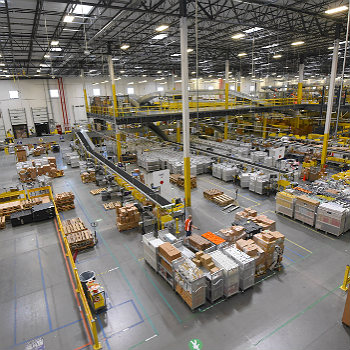Amazon on Tuesday announced plans to increase the company’s US minimum wage to $15, in the wake of increasing pressure from Senator Bernie Sanders, the “Fight For $15” campaign and labor unions across the country, USA Today reports. Beginning on November 1, 2018, all full-time, part-time, seasonal and temporary employees for the retail giant will now make at least $15 per hour, more than twice the current federal minimum wage of $7.25.
Amazon Wage Increase Affects 350K Employees
Amazon says the wage increase will impact over 250,000 full- and part-time employees, along with more than 100,000 seasonal staff members, who are hired to handle increased delivery orders around the holiday season.
Following the announcement, Amazon CEO Jeff Bezos, currently the wealthiest man in the world, said his company was prepared to lead other large employers in ramping up employee compensation. “We listened to our critics, thought hard about what we wanted to do, and decided we want to lead,” Bezos said. “We’re excited about this change and encourage our competitors and other large employers to join us.”
Worker Advocates Challenge Amazon
Jeff Bezos is worth about $150 billion. Amazon is one of the world’s largest companies, valued at around $1 trillion. The corporation has faced strong criticism over the working conditions imposed on employees, including the conditions in Amazon fulfillment centers.
Over the summer, Amazon’s operations in Europe were disrupted by a series of wide-scale worker protests.
Bernie Sanders Attacks Bezos In New Bill
Amazon has distanced itself from suggestions that the change is due to pressure from Senator Sanders, but the Senator has become an outspoken critic of the company in recent years. In September, Sanders introduced a bill entitled the Stop Bad Employers by Zeroing Out Subsidies Act (Stop BEZOS) that targeted Amazon directly.
Sanders has long argued that major retailers, including Amazon and Walmart, pay such low wages that even full-time employees are forced to go on government assistance to pick up the slack. The Stop BEZOS Act, designed to force employers to pay a “living” wage, would impose a tax on corporations with 500 or more employees. The tax would be equal to the amount of money the company’s employees receive in federal benefits, including food stamps and subsidized housing. In the past, Senator Sanders has characterized the way Amazon treats its workers as “absurd.” Amazon has responded to Sanders, calling the Senator’s attacks “inaccurate and misleading.”
UK Workers Get A Boost, Too
Amazon’s wage increase isn’t just limited to the United States. Across the pond, in the United Kingdom, Amazon workers will also see a boost beginning on November 1st. Employees in London will receive a new minimum wage of £10.50, or $13.60, while the rate will rise to £9.50 for the rest of the United Kingdom.
Interviewed by the BBC, Frances O’Grady, general secretary for the UK’s Trades Union Congress, warned against seeing Amazon’s move as an example of magnanimity. “Today’s announcement,” she said, “is the result of campaigning by […] unions around the world. It’s only a start and shouldn’t be spun as a huge act of generosity.”
Many of Amazon’s competitors have already been forced to raise worker wages. Last year, Target increased its minimum wage to $11 per hour, with plans to raise the rate to $15 by 2020. In a similar move, Walmart raised its minimum wage to $11 an hour at the beginning of 2018.
Why Is Amazon Raising Wages?
While many on the left have attempted to ascribe these moves to growing pressure from a newly-resurgent labor movement, there are also clear economic reasons for raising the minimum wage at a company.
The American labor market is tight. Unemployment has reached a record low. The US economy is booming. So is Amazon. The company’s growth has been explosive in recent years. With growth has come a ravenous appetite for labor; Amazon needs to hire more workers, but it’s having a harder and harder time doing so, because most employees are already employed.
Thus, increasing the company’s minimum wage could just be a way of attracting more workers in an increasingly-competitive labor market. And attracting those workers has never been more important than now, in the run-up to the holiday season.
